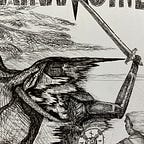The original idea is the source of everything human, such as my original idea to start a blog.
But I’m giving up writing here. This is my final message to you all, in hopes that you will do what I cannot. It’s nothing personal, but I have realized that the task I set out upon in starting this blog has been a circular one.
With all of the royal cellophane brushed off, my goal has been to promote free thought by telling the citizens of Medium what to think.
Laughably contradictory on the face of it.
I cannot and should not tell you what to think: it is fundamental that you have truly unique ideas. But we all find that’s harder than it sounds.
Free thought is how we flower as human beings. Mental cultivation, however, has become lost in the weeds of modern life, as it is decidedly not pragmatic. It will not increase productivity, teach you a new skill, or get you a better job you want. As modern people, it’s clean and easy to do and think what we’re told. That system is the foundation of modern life. On the contrary, free thought is the foundation of free will.
It would be nice for you to agree with all I have said in my time on Medium, but doubtless nobody cares. It is far more important that we all cultivate our minds to think independent of what certain sources tell us. And so, I would like to (laughably contradictory still) tell you what I think is the straightest path (for convenience, starting absolutely from scratch) to cultivating an independent mind.
First, it helps to get smart. You’re probably there already, but it’s good to just be curious about stuff and read the respective Wikipedia articles.
The second step (I shouldn’t say step ‘cause it’s a journey) is the important one: some call it philosophy or gaining wisdom, but really it is learning about both sides of an issue and questioning it. By issue I mean a philosophical one. For a quick start, read Plato’s Euthyphro and think about how you would answer the question proposed by the book and discussed by the characters.
From personal experience, I’d recommend this first because Euthyphro has a clear-cut question and is (perhaps most importantly) short. Also, the character dialogue is a good example of the Socratic method, which is the basic method of freely arguing a question back and forth.
If you get into Plato, some more options to start with are Ion, Apology, and Lesser Hippias. Then there are formidable works such as Timaeus and Republic.
It’s rare, of course, to find philosophical dialogues such as in Plato, so the next thing to do is to note the greater dialogues between different great works. Literally look up some iteration of ‘greatest books of all time’ online, and start reading. The greater dialogue doesn’t make sense at first. But then you can start to see the threads between John Locke’s Second Treatise on Government and Atlas Shrugged (or the contrast that both have with Rousseau’s The Social Contract). Or the Bhagavad-Gita and Tao Te Ching. Maybe Marcus Aurelius and Dune.
This is the tip of the iceberg, but the journey down is worthwhile. Converse with yourself and with history, for once out of the context of right and wrong answers. What you’ll find, I don’t know, it’s entirely yours.
“And there’s faith and there’s sleep
We need to pick one please because
Faith is to be awake and to be awake is for us to think
And for us to think is to be alive” —Twenty One Pilots, Car Radio
